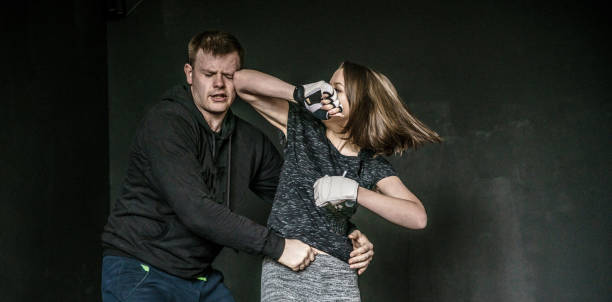Self defence is the act of defending yourself with force or physical means. But do you have the right to defend yourself? The answer is yes, under certain circumstances. Self-defence laws exist to protect individuals from harm, but understanding the legal boundaries and how to act appropriately is crucial. The laws surrounding self-defense vary depending on your location. However, some general principles apply in many jurisdictions:
The self defence law in New South Wales (NSW) falls under Division 3 of Part 11 of the Crimes Act 1900. Section 418 of the Act provides that a person is not criminally responsible for an offence if the person carries out the conduct constituting the offence in self defence. In 2002, New South Wales reintroduced excessive self defence as s421 of the Crimes Act (NSW).
When To Use Self Defence
To rely on the “self defence” argument, the person must have believed that their conduct was necessary:
- Defend themself or another person, or
- Prevent or terminate the unlawful deprivation of their liberty or the liberty of another person, or
- Protect property from unlawful taking, destruction, damage, or interference, or
- Prevent criminal trespass to any land or premises or to remove a person committing such criminal trespass.
The person’s belief must have been reasonable in the circumstances as they perceived them. This means the person should base their belief on what a reasonable person would have believed in the same situation. Moreover, the prosecution has the onus of proving, beyond reasonable doubt, that the person did not carry out the conduct in self defence.
Note: The Court will not excuse the intentional use of deadly forces that cause serious injury or death in cases of real or personal property. In determining the issue of whether the accused personally believed that his or her conduct was necessary for self-defence, the jury must consider the circumstances as the accused perceived them to be at the time.
When to Not Use Self Defence?
The rule on self defence does not apply if the person believes that the use of force that involves the intentional or reckless infliction of death only:
- to protect property, or
- to prevent criminal trespass or to remove a person committing criminal trespass.
Self Defence Weapons in NSW
Are self-defence weapons legal in New South Wales? In Australia, the law generally forbids an individual to carry or use weapons for self-defence. These are the rules in NSW:
- It is not a “genuine purpose” to possess or use a prohibited weapon for defence of oneself or to protect another person.
- A body armour vest or similar item worn over or covers any portion of the body and made for anti-ballistic purposes, such as defence against electric shocks or conducted energy weapons, is allowed for use.
While some Australian states allow women to carry certain self-defense weapons with proper permits, New South Wales does not. Carrying a weapon for self-defence as a woman in NSW remains illegal without a current permission, which can be difficult to obtain.

The Weapons Prohibition Act 1998
The Weapons Prohibition Act 1998 (NSW) is a piece of legislation that prohibits possessing, using, and selling certain weapons in New South Wales. The creation of the Act was in reasonable response to concerns about the increasing availability of weapons and the associated risk of violence.
This Act classifies which weapons are “prohibited weapons.” Here are some prohibited weapons that Schedule 1 of the Act enumerates:
- Flick knife
- Ballistic knife
- Sheath knife
- Butterfly knife or “balisong”
- Star knife
- Zombie knife
- Any device intended for use by a military or defence force
- Any bomb, grenade, rocket, missile, or mine
- Flame thrower
- Spear gun
- Crossbow
- Slingshot
- Saunders hunting sling
- Blow-gun or blow-pipe
- Farallon shark dart
- Dart projector
- Mace
Offence and Penalties Under the Weapons Prohibition Act
The Act sets out several penalties for offences under the Act. These penalties vary depending on the specific offence. Part 4 of the Act enumerates the offences with their corresponding penalties:
| Offence | Penalties |
| Buying a prohibited weapon without authorised permit to possess it | 5 years imprisonment |
| Purchasing a prohibited weapon from a seller who does not have an authorised permit to possess it and has failed to see the seller’s permit or knows the seller doesn’t have authority | 12 months’ imprisonment and/orAUD 5,500 fine |
| Selling prohibited weapon to buyer who doesn’t have authorised permit to possess it | 14 years imprisonment |
| Manufacturing a prohibited weapon without a permit | |
| Possessing a digital blueprint for the manufacture of a prohibited weapon on a 3D printer or an electronic milling machine (unless authorised under a permit) | |
| Possessing or using a prohibited weapon by remote control without permit | |
| Selling military-style weapon to a buyer who doesn’t have authorised permit to possess it | 20 years imprisonment |
| Selling military-style weapons to a buyer who doesn’t have an authorised permit to possess it and does this on at least three occasions over a consecutive 12-month period. | |
| Manufacturing military-style weapon without permit | |
| Possessing or using military-style weapon by remote control without permit |
More Information About Self Defence
The Weapons Prohibition Act 1998 outlines a range of penalties for offenses involving weapons. These penalties can vary depending on the specific circumstances of the case. It also includes the type of weapon involved and the severity of the offense. Potential penalties may include:
- Imprisonment: The Act prescribes maximum imprisonment terms for various offenses.
- Fines: Depending on the offense, a judge may impose a fine in addition to, or instead of, jail time.
- Weapon Prohibition Orders: A conviction can result in a court order prohibiting you from possessing any weapons for a specific period.
It’s important to remember that a conviction under the Weapons Prohibition Act can have broader repercussions. For instance, it may affect your employment prospects or your ability to obtain certain licenses.
The Blake Davis Manslaughter
Blake Davis will serve a minimum sentence of two years and nine months in jail for the manslaughter of rapper Jett McKee, who broke into his home in 2018 brandishing a fake pistol and struck him in the face with knuckle dusters.
The jurors have thought Davis’ self-defence response, using a samurai sword to fracture Mr. McKee’s skull after his girlfriend, Hannah Quinn, chased the intruder down the street, was excessive, as seen by their conviction of manslaughter rather than murder.
Blake Davis and his girlfriend, Hannah Quinn, found themselves face-to-face with intruders – Jett McKee and Daniel O’Donnell. McKee, armed with a replica gun and knuckle dusters, attacked Davis.
In the chaos, Quinn pursued McKee down the street, with Davis following close behind. However, Davis was armed with a samurai sword. He caught up to McKee and delivered a fatal blow to the head with the sword. Davis was initially charged with murder, but the jury ultimately acquitted him.
Despite the murder acquittal, Davis was found guilty of manslaughter and sentenced to over five years in prison. The jury likely felt his use of force, a samurai sword, was excessive in the situation. Quinn, who chased the initial attacker, was convicted of being an accessory after the fact to manslaughter and received a jail sentence.
This case, known as the “Sydney samurai sword killing,” ignited discussions about the legal boundaries of self-defense in Australia. While Davis claimed he acted to protect himself, the justice system ultimately deemed his response – using a samurai sword – as going beyond reasonable self-defense measures.

How Can Our Lawyers Help?
Lawyers are instrumental in criminal proceedings especially for self defence matters. Criminal defence lawyers can help in self-defence cases in several ways, including:
- Advising on the law of self-defence
- Gathering evidence
- Negotiating with the prosecution
- Preparing for trial
- Presenting the case to the court
If an accused believed that they acted in self-defence and have reasonable grounds to defend your actions, it is crucial to speak to a lawyer as soon as possible. JB Solicitors can help you understand your legal rights and build a strong defence.
Contact us today.
